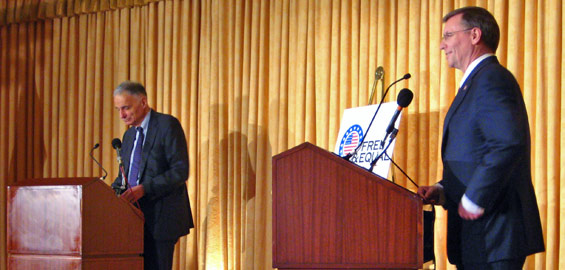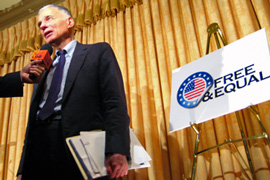US third parties fight to be heard
Nader and Baldwin debate in the shadow of the Democrats and Republicans.


Nader, left, debated with Baldwin in Washington DC on Thursday
Two US presidential candidates have gone head-to-head over issues including the economy, the “war on terror” and flaws in the nation’s healthcare system.
But neither man represented the Democrats or the Republicans.
Although they run much lower-profile campaigns than the two presidential contenders, Republican John McCain and Democrat Barack Obama, they are the third-party candidates in this year’s race for the White House.
| Third parties |
|
Video: Third parties spar over strategy Video: The impact of independents |
Ralph Nader, a longstanding consumer activist, and Chuck Baldwin, a former Baptist priest, took to the modest flag-rimmed stage in Washington DC’s Mayflower Hotel on Thursday as cameras fed their images live.
But while the two candidates stand on opposite ends of the political spectrum – Nader a progressive independent and Baldwin representing the conservative Constitution party – no heated words were exchanged and no verbal barbs were directed at the other’s platform.
Instead the pair – who have virtually no chance of occupying the White House – used their limited air time to level criticism at McCain and Obama and at the media they called “derelict” in its duties.
Nader accused Obama of being a “warmonger” and “a corporatist to the core”.
Baldwin rounded on the candidate of his former Republican party, saying: “A wasted vote in 2008 is a vote for John McCain, because I don’t think McCain can win this election any more than Bob Dole in 1996.”
He also accused the mainstream American press of becoming “lapdogs of the two major parties” by all but blocking access to the public for independent candidates.
No access
Notably absent from the debate were Cynthia McKinney, the presidential nominee of the Green Party which backed Nader for the US presidency in 2000, and the Libertarian candidate Bob Barr, one of the highest-profile third-party candidates.
Despite a tradition of riding the latest wave of unhappiness with the two main parties, no independent candidate has ever come close to winning the White House.
One reason for this is a lack of campaign organisation and fundraising comparable to that of the two political behemoths.
| In depth |
|
Map: US & the World Video: Home forclosures leave tenants in the lurch Focus: US military aid troubles Africa |
“Barack Obama raises more in one day than our entire campaign,” Nader said.
Nader’s campaign is spending $4m as opposed to more than $600m that Obama has raised.
Another contentious issue is the privately run presidential debates, which critics call a “shared monopoly” between the Democrats and Republicans.
Michael Kazin, a historian at Georgetown University, told Al Jazeera: “They team up in various ways to make it very difficult for the other parties to first get on the ballot on a state-by-state basis and then to take part in the debates, which on the presidential level have become absolutely critical.”
Billionaire Ross Perot was the most successful independent candidate in recent history, winning a place in the 1992 presidential debates.
But although he won a fifth of the popular vote nationwide, he failed to win a single state.
Critics of third-party candidates say they spoil elections by siphoning votes away from candidates who have a real chance of winning.
In 2000, Democrats accused Nader of drawing votes away from Al Gore in Florida, effectively handing the state, and ultimately the presidency, to George Bush.
“If the Democrats wanted to win, they could’ve won … it could have been any candidate,” one third-party supporter attending the debate said.
Adam Eurich, an architect from Austin, Texas, said he’d vote for Nader “no matter what”.
“I mean, I love Obama, but I prefer to vote for third-party candidates,” he said.
“It’s more about trying to change the mentality of things. If it leads to change decades down the line, that’s fine.”
Co-opted ideas
Even if the candidates don’t get elected though, Herman Cohen, a diplomat who worked in the senior President Bush’s administration, says third parties play an important role in the US democratic process.
 |
| Nader’s campaign is spending about $4m compared to $600m that Obama has raised |
“During presidential elections they bring out these tough issues – these emotional issues – and the big parties have to listen,” he told Al Jazeera.
“Before [Nader] there was no talk of environmental issues.
“He pounded away at this at every election and, after a while, the public started paying attention and demanding of the mainline politicians that they do something about the environment.'”
Kazin says adopting third-party ideas is a historical pattern.
“One way or another, the major parties tend to co-opt or absorb that discontent after a while, after they see how powerful that third party is,” he said.
This election season, the major issue being brought into focus is the financial turmoil plaguing Wall Street and the Bush administration’s $700bn rescue plan.
“This $700bn bailout, which is just the first installment … is a fraud against the American people,” Baldwin said as he criticised the financial system as a whole.
“We created money out of thin air … there is nothing behind our supposed wealth. We’ve created the greatest debtor nation in the history of the world.”
Nader lambasted the government’s bailout as well, calling it “the last enactment of the collapse of corporate capitalism”.
“We need public prosecution,” he said. “People are demanding justice.”
With the election less than two weeks away and Obama leading by several points in most major opinion polls, third-party candidates do not look likely to create any upsets this year.
All they can hope for is to be heard.

